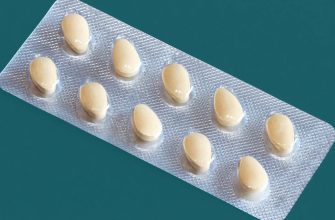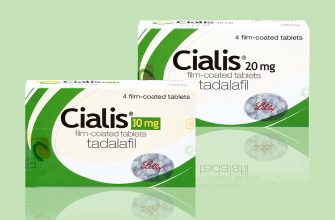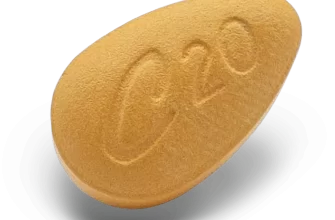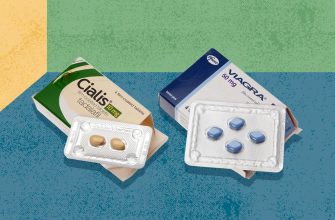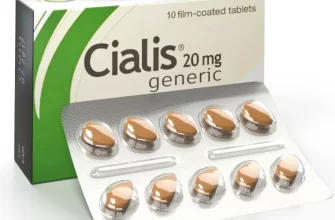Seeking information on peptides and their potential interaction with Cialis? Focus on specific peptide types like PT-141, known for its effects on libido. Research suggests potential synergistic effects with Cialis, but individual responses vary greatly. Always consult a healthcare professional before combining these substances.
Remember, Cialis is a prescription medication. Combining it with peptides requires careful medical oversight to avoid potential adverse reactions or drug interactions. Thorough understanding of both Cialis’s mechanism and the specific peptide’s profile is paramount. This ensures safe and informed use.
Specific peptide research is crucial. Look for studies detailing the effects of individual peptides on erectile function and libido. Reliable sources, such as peer-reviewed medical journals, will provide the most accurate information. Avoid anecdotal evidence or unsubstantiated claims.
Don’t hesitate to discuss your health concerns and treatment options with your doctor. They can assess your individual health status and provide tailored advice based on your medical history and current medications. Open communication with your doctor is key to responsible peptide and medication management.
- Peptides and Cialis: Understanding the Connection
- What are Peptides and How Do They Relate to Erectile Dysfunction?
- Mechanisms of Action
- Specific Peptides and ED
- Important Considerations
- Further Research
- Peptides vs. Cialis: Comparing Efficacy and Side Effects
- Peptide-Based Approaches
- Choosing the Right Approach
- Important Note
- Using Peptides for Erectile Dysfunction: Safety and Considerations
- Potential Side Effects
- Peptide Selection and Dosage
- Alternative Treatments
- The Future of Peptides in Erectile Dysfunction Treatment
Peptides and Cialis: Understanding the Connection
Cialis, a phosphodiesterase-5 (PDE5) inhibitor, improves erectile function by increasing blood flow to the penis. Certain peptides, however, may indirectly influence this process by affecting pathways involved in nitric oxide (NO) production or vascular health. This connection is complex and not fully understood.
Some research suggests that peptides like melanotan II might enhance libido and potentially indirectly support erectile function due to its effects on melanocortin receptors, impacting hormone regulation. However, more research is needed to confirm this relationship specifically to Cialis’s mechanism of action.
Other peptides, those involved in growth hormone release, could theoretically affect vascular health over time, thereby influencing erectile function. The impact, if any, would be indirect and likely long-term, unlike the immediate effects of Cialis.
It’s crucial to note that the interaction between peptides and Cialis isn’t directly antagonistic or synergistic, meaning the peptides don’t directly block or boost Cialis’s effects. Instead, any impact stems from influencing related physiological pathways.
Before using peptides alongside Cialis, consult a healthcare professional. They can assess your health, discuss potential risks and benefits, and guide you towards safe and effective treatment options for erectile dysfunction.
What are Peptides and How Do They Relate to Erectile Dysfunction?
Peptides are short chains of amino acids, the building blocks of proteins. They act as messengers, influencing various bodily functions. Some peptides show promise in treating erectile dysfunction (ED).
Mechanisms of Action
Certain peptides might improve ED by:
- Increasing nitric oxide production, leading to improved blood flow to the penis.
- Stimulating the production of hormones involved in sexual function.
- Improving nerve function related to erectile response.
Specific Peptides and ED
Research is ongoing, but some peptides, like PT-141, have demonstrated potential in clinical trials. However, more studies are needed to confirm their long-term efficacy and safety. Consult a healthcare professional before using any peptide for ED.
Important Considerations
- Safety: Peptide use requires medical oversight due to potential side effects and interactions with other medications.
- Dosage: Appropriate dosage is crucial for efficacy and safety, requiring expert guidance.
- Regulation: The regulatory status of peptides for ED varies across countries. Ensure you’re using products from reputable sources.
- Alternatives: Traditional ED treatments (like PDE5 inhibitors) remain established options. Discuss all options with your doctor.
Further Research
The role of peptides in ED treatment is an active area of research. New findings may refine understanding and treatment options over time. Stay informed by consulting peer-reviewed studies and your doctor.
Peptides vs. Cialis: Comparing Efficacy and Side Effects
Cialis directly increases blood flow to the penis, resulting in improved erectile function. Its efficacy is well-documented, with success rates varying depending on the dosage and individual factors. Common side effects include headache, flushing, nasal congestion, and indigestion. More serious, though rare, side effects are possible.
Peptide-Based Approaches
Several peptides are being researched for their potential in treating erectile dysfunction. These peptides may work through different mechanisms than Cialis, potentially impacting nitric oxide production or other signaling pathways involved in penile erection. Current research suggests that some peptides show promise, but large-scale clinical trials are needed to confirm their efficacy and safety profiles. The side effect profiles are generally considered milder than those of Cialis, but further research is necessary to fully understand the long-term effects.
Choosing the Right Approach
Cialis offers a proven and readily available treatment option for erectile dysfunction. Its efficacy is well-established, although side effects are a consideration. Peptide-based treatments represent a newer area of research with potential benefits, but their long-term effects and efficacy require further investigation. Consult a healthcare professional to determine the best treatment option for your individual needs and health status. They can discuss risks and benefits, considering your medical history and preferences.
Important Note
Always consult a doctor before starting any new medication or supplement, including peptides or Cialis. Self-treating can be dangerous. A physician can properly diagnose the underlying cause of erectile dysfunction and recommend the most appropriate course of action. They can also monitor for any adverse reactions and adjust treatment as needed.
Using Peptides for Erectile Dysfunction: Safety and Considerations
Consult a healthcare professional before using peptides for erectile dysfunction (ED). Peptide therapy isn’t a standardized treatment, and dosages vary greatly depending on individual needs and the specific peptide used. Improper use can lead to adverse effects.
Potential Side Effects
Potential side effects can include nausea, headaches, and changes in blood pressure. Some peptides might interact with existing medications. Thoroughly discuss your medical history and current medications with your doctor to minimize risks. Regular blood tests and monitoring can help detect and manage potential problems.
Peptide Selection and Dosage
The selection of a specific peptide and its appropriate dosage should be determined by a qualified medical practitioner. Self-treating with peptides can be dangerous. A doctor can assess your individual needs and create a tailored treatment plan. They’ll also help you understand the expected outcomes and potential risks.
Alternative Treatments
Remember that peptides aren’t the only ED treatment option. Lifestyle changes like diet and exercise, along with other medications, might be more suitable for some individuals. Discuss alternative therapies with your doctor to find the best approach for your specific situation. A combined strategy might prove most effective.
The Future of Peptides in Erectile Dysfunction Treatment
Expect increased research focusing on peptide combinations for synergistic effects, potentially offering improved efficacy and reduced side effects compared to single-peptide therapies. This targeted approach may lead to personalized treatment plans based on individual patient profiles.
Clinical trials will explore novel peptide delivery methods, such as nasal sprays or transdermal patches, aiming for enhanced bioavailability and patient convenience. This could eliminate the need for injections, improving patient compliance.
We anticipate further investigation into the underlying mechanisms of peptide action in erectile dysfunction. This deeper understanding could reveal new therapeutic targets and lead to the development of even more targeted and effective treatments.
The development of bioengineered peptides with enhanced stability and longer half-lives is a promising area. Longer-lasting effects would reduce the frequency of administration and improve treatment adherence.
Researchers are actively pursuing the identification of new peptides with improved potency and fewer off-target effects. This will focus on optimizing the peptide sequences for maximal efficacy and minimal side effects.
Expect greater integration of peptide therapies with other ED treatments. Combination therapies may enhance overall outcomes, potentially offering a broader range of treatment options for men with varying degrees of erectile dysfunction.


